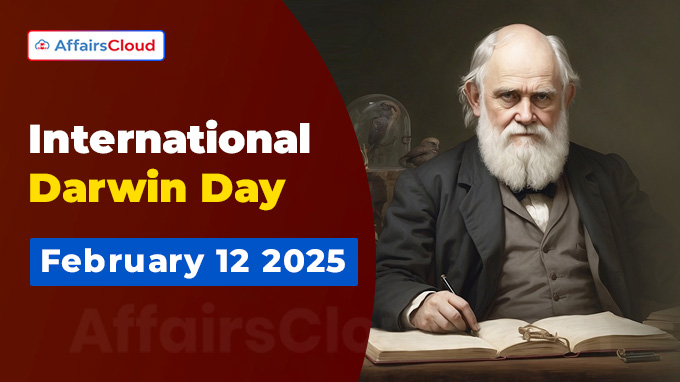 International Darwin Day is observed annually on 12 February across the globe to commemorate the birth anniversary of Charles Robert Darwin, the 19th-century British Naturalist and Geologist renowned for formulating the “Theory of Evolution by Natural Selection”. The day serves to inspire continued advancements in scientific research and understanding.
International Darwin Day is observed annually on 12 February across the globe to commemorate the birth anniversary of Charles Robert Darwin, the 19th-century British Naturalist and Geologist renowned for formulating the “Theory of Evolution by Natural Selection”. The day serves to inspire continued advancements in scientific research and understanding.
- It highlights the importance of evolutionary biology and encourages the pursuit of knowledge through scientific inquiry.
Background:
i.International Darwin Day was first championed by 3 passionate Darwin supporters: Dr. Robert Stephens, Professor Massimo Pigliucci, and Amanda Chesworth.
ii.In 1995, Dr. Robert Stephens led the effort to celebrate Darwin’s legacy in Silicon Valley, United States of America (USA).
iii.In 1997, Professor Massimo Pigliucci organized the first Darwin Day events at the University of Tennessee, USA.
iv.In 2000, Amanda Chesworth joined Robert Stephens to formalize the Darwin Day program in New Mexico, USA.
v.In 2002, the initiative became the ‘Darwin Day Celebration’, a 501(c)(3) nonprofit educational corporation in California, USA.
Significance:
i.The day honors his contributions to science and promotes scientific thinking, critical inquiry, and the understanding of evolution.
ii.It serves as a reminder that scientific discoveries are fundamental to advances in medicine, genetics, and environmental protection.
iii.It also provides an opportunity for schools, universities, and educational organizations to highlight the importance of scientific research.
About Charles Robert Darwin:
i.Charles Robert Darwin, born on February 12, 1809, in Shrewsbury, England, United Kingdom (UK) was an English naturalist, geologist, and biologist whose groundbreaking work laid the foundation for evolutionary biology.
ii.Voyage on the HMS Beagle (1831–1836): In 1831, he embarked on a 5-year voyage to South America, the Galapagos Islands aboard the His Majesty’s Ship (HMS) Beagle, during which he meticulously collected specimens and made observations that would later inform his theories on evolution.
iii.Post-Voyage Research: Upon returning to England in 1836, he dedicated several years to analyzing his findings and developing his theory of evolution by natural selection.
iv.Publication of ‘On the Origin of Species’ (1859): In 1859, he published his thoughts about evolution and natural selection in the book “On the Origin of Species,” which laid the groundwork for profound advancements in both biology and philosophy.
- This process is driven by the differential survival and reproduction of individuals with traits better suited to their environment.
iv.He passed away on April 19, 1882, at the age of 73, in London, UK and was interred in Westminster Abbey, London, UK on April 26, 1882.
Publications and Theories:
i.On the Origin of Species (1859): Introduced the theory of evolution by natural selection.
ii.The Descent of Man, and Selection in Relation to Sex (1871): Explored human evolution and sexual selection.
iii.The Expression of the Emotions in Man and Animals (1872): Examined the evolution of human emotions.
iv.The Formation of Vegetable Mould through the Actions of Worms (1881): Investigated the role of earthworms in soil formation.




